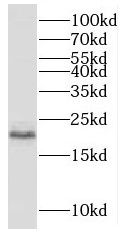Products
MCTS1 antibody
Category:
Research Area:
- SPECIFICATIONS
- Product Name
- MCTS1 antibody
- Catalogue No.
- FNab05070
- Size
- 100μg
- Form
- liquid
- Purification
- Immunogen affinity purified
- Purity
- ≥95% as determined by SDS-PAGE
- Clonality
- polyclonal
- Isotype
- IgG
- Storage
- PBS with 0.02% sodium azide and 50% glycerol pH 7.3, -20℃ for 12 months(Avoid repeated freeze / thaw cycles.)
Immunogen
- Immunogen
- malignant T cell amplified sequence 1
- Alternative Names
- MCT1 antibody
- UniProt ID
- Q9ULC4
- Observed MW
- 21 kDa
Application
- Tested Applications
- ELISA, WB
- Recommended dilution
- WB: 1:500-1:2000
Validated Images
 mouse bladder tissue were subjected to SDS PAGE followed by western blot with FNab05070( MCTS1 Antibody) at dilution of 1:600
mouse bladder tissue were subjected to SDS PAGE followed by western blot with FNab05070( MCTS1 Antibody) at dilution of 1:600
- Background
- Anti-oncogene that plays a role in cell cycle regulation; decreases cell doubling time and anchorage-dependent growth; shortens the duration of G1 transit time and G1/S transition. When constituvely expressed, increases CDK4 and CDK6 kinases activity and CCND1/cyclin D1 protein level, as well as G1 cyclin/CDK complex formation. Involved in translation initiation; promotes recruitment of aminoacetyled initiator tRNA to P site of 40S ribosomes. Can promote release of deacylated tRNA and mRNA from recycled 40S subunits following ABCE1-mediated dissociation of post-termination ribosomal complexes into subunits. Plays a role as translation enhancer; recruits the density-regulated protein/DENR and binds to the cap complex of the 5'-terminus of mRNAs, subsequently altering the mRNA translation profile; up-regulates protein levels of BCL2L2, TFDP1, MRE11A, CCND1 and E2F1, while mRNA levels remains constant. Hyperactivates DNA damage signaling pathway; increased gamma-irradiation-induced phosphorylation of histone H2AX, and induces damage foci formation. Increases the overall number of chromosomal abnormalities such as larger chromosomes formation and multiples chromosomal fusions when overexpressed in gamma-irradiated cells. May play a role in promoting lymphoid tumor development: lymphoid cell lines overexpressing MCTS1 exhibit increased growth rates and display increased protection against apoptosis. May contribute to the pathogenesis and progression of breast cancer via promotion of angiogenesis through the decline of inhibitory THBS1/thrombospondin-1, and inhibition of apoptosis. Involved in the process of proteasome degradation to down-regulate Tumor suppressor p53/TP53 in breast cancer cell; Positively regulates phosphorylation of MAPK1 and MAPK3. Involved in translation initiation; promotes aminoacetyled initiator tRNA to P site of 40S ribosomes. Can promote release of deacylated tRNA and mRNA from recycled 40S subunits following ABCE1-mediated dissociation of post-termination ribosomal complexes into subunits.



